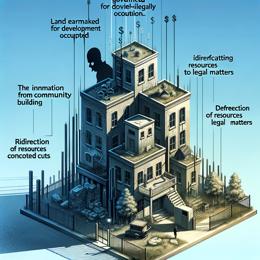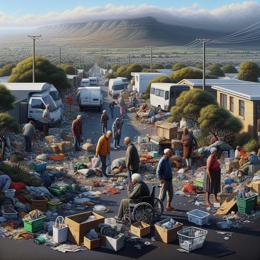Content created by AI
Displaced Families Grapple with Inadequate Facilities in Cape Town's Temporary Settlement
In the midst of efforts to restore the functionality of Cape Town's central railway line, a critical issue has overshadowed the relocation of families who once called the tracks their home. The residents, forcibly moved from the railway reserve, now find themselves in a precarious situation, faced with the critical lack of water and sanitation at their temporary settlement next to Stock Road station.
The relocation is a significant part of Operation Bhekela, a comprehensive initiative aimed at clearing informal settlements from the railway line to reinstate service to vital areas of the city by March next year. However, what was intended to be a step towards revitalizing public transportation has turned into a humanitarian concern with serious implications for those involved.
Scores of families, who have settled into their temporary housing, have encountered days on end without access to running water or functioning chemical toilets. Despite the presence of facilities, their non-operational state has left residents with no option but to seek assistance from neighboring communities or resort to using the surrounding bush as makeshift toilets.
The city’s relocation plan comes after a prolonged period of disruption on the railway line, stemming from theft, vandalism, and the eventual lapse of security contracts by PRASA. The rail infrastructure, which first ceased operation in October 2019, further deteriorated during the COVID-19 lockdown. In the economic fallout, many who couldn't afford rent sought refuge along the railway's reserves, signaling a dire need for affordable housing solutions.
Interviews with the affected residents reveal the extent of the hardships they face in the absence of basic amenities. From a mother having to wander in search of water to a family that finds their new plot too small for their home, frustration is palpable among the relocated individuals. With a firm stance against moving to a space that lacks the most rudimentary of services, the community's plea is clear: they require the resolution of sanitation and water issues before further relocations can proceed.
While the land rests under PRASA's jurisdiction, the responsibility for providing water, sanitation, and waste removal services falls upon the City of Cape Town. Declarations from both PRASA and the city officials point to a delivery of chemical toilets and a water tanker service, yet the reality on the ground, as witnessed firsthand, contradicts these claims.
These logistical failures have raised broader questions about the readiness and capacity of both PRASA and the City of Cape Town to manage such relocations effectively, upholding the dignity and well-being of those displaced.
The community's plight underscores a growing urgency for municipalities to address the basic needs of their constituents, especially when altering the landscapes of their lives. As the city pushes ahead with infrastructure projects, it's imperative that human factors don’t fall by the wayside. This story serves as a stark reminder that with progress, must come the guarantee of humane living conditions for all.










